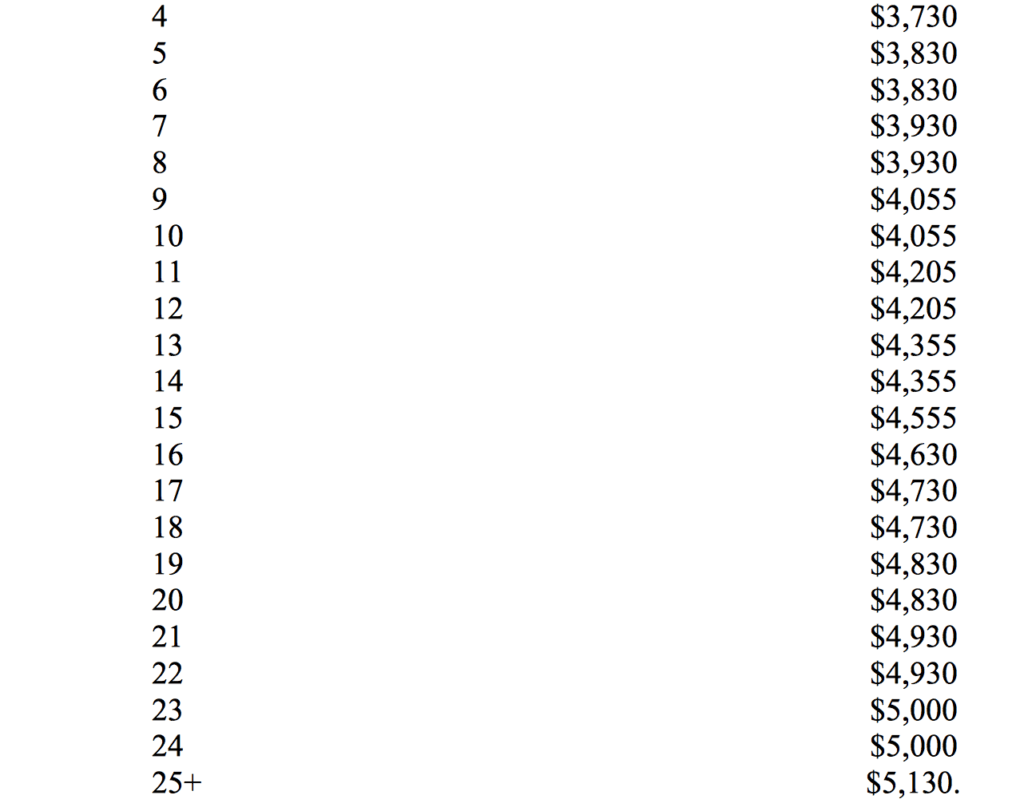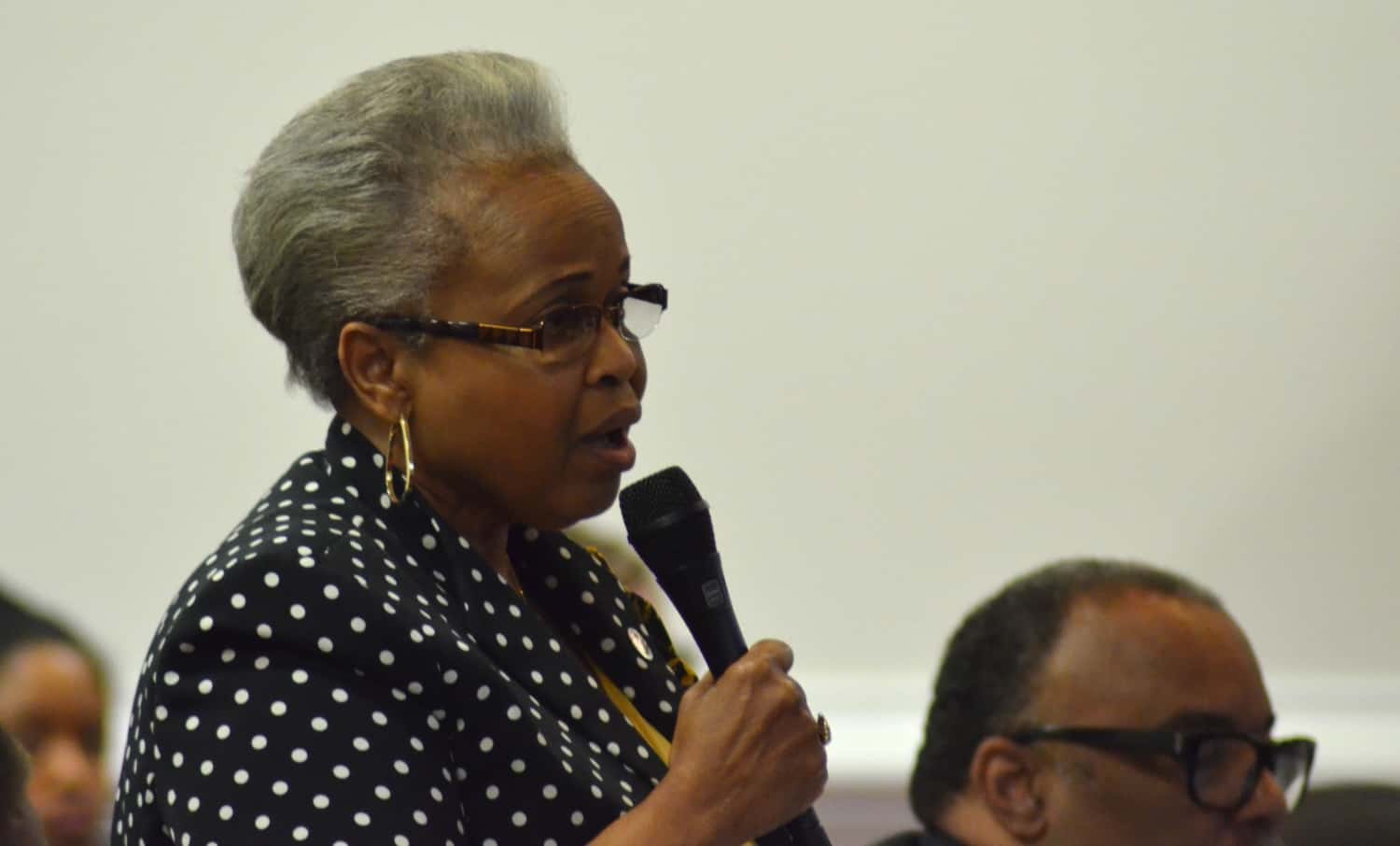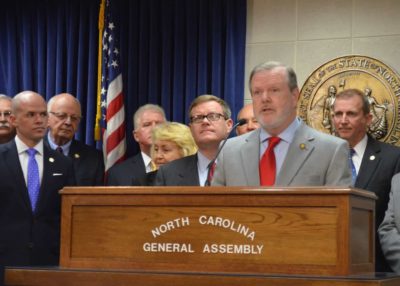In a 38 to 11 vote, the Senate gave preliminary approval tonight to the budget compromise created by Republican leaders. The plan adds almost $700 million to public education over the next two years, giving teachers an average 3.3 percent salary increase in the first year and a 9.6 percent increase over the biennium.
The teacher pay proposal is weighted in favor of experienced teachers and includes both a step increase as well as $5 million in each year that can go towards bonuses for those teachers.
The teacher pay proposal in the budget compromise is not far afield from the earlier Senate and House plans.
Under the Senate’s original plan the average teacher pay raise was 3.7 percent in the first year and 9.5 percent over the biennium. Under the House plan, the average teacher salary increase would have been 3.3 percent in 2017-18 and between 9 and 9.5 percent over the biennium. The Senate plan would have given beginning teachers and teachers with 25 years or more of experience no raise, while the House plan was more heavily weighted towards teachers later in their careers.




Democrats criticized the teacher salary components. Sen. Gladys Robinson, D-Guilford, said the budget came up short in many areas of education, including pre-K and teacher salaries.
She pointed out that there are different programs in the budget benefiting teachers, but she argued that a widespread pay increase would be more effective.
“We could really solve the problem holistically if we go ahead and increase the average teacher salary to the national,” she said.
Senate President Pro Tempore, Phil Berger, R-Rockingham, said later in the session that the budget compromise does a number of things that the governor wanted, including raising teacher pay. Under the governor’s proposal, teacher pay would have increased about 10 percent over the biennium. Berger argued that the raises in the budget compromise were comparable.
On NC Pre-K, Robinson decried the fact that the budget does not fully eliminate the waitlist for the program.
The budget includes money to eliminate about 75 percent of the waiting list for NC Pre-K. The House version of the budget would have eliminated the waiting list, while the Senate version would have added about 1,150 slots in the first year of the biennium and 2,350 slots in the second year.
Robinson said her family was concerned about her four-year-old grandson because he seemed a little slower than her granddaughter. And then he went to Pre-K, she said, and “soared.”
“So I know that for children who don’t have that kind of support, how important it is to have pre-K programs,” she said. “And just with a little less tax breaks for corporations and the wealthy, this could have been done.”
Both the House and Senate’s original budget plans would have boosted principal pay, though neither included information on what kind of average salary increase principals and assistant principals could have expected. The final budget compromise gives principals an average 8.6 percent salary increase over two years and assistant principals a 13.4 percent average salary increase over the biennium. The proposal also includes a bonus program.
The salary schedule for principals would be based on the average daily membership of the school with principals able to make more depending on the school’s academic growth score.


Katherine W. Joyce, executive director of the North Carolina Association of School Administrators, expressed her support for the proposal in an e-mail.
“We appreciate the legislature’s significant investment of $35 million to raise principal and assistant principal pay, as well as their decision to revamp the base schedules for both, rather than switching to a problematic block grant they had earlier considered,” she said. “The new bonus program for principals will serve as a helpful supplement to their base pay and may help with efforts to encourage high-flying principals to take on struggling schools for the opportunity for higher say. We will continue to work with the House and Senate to further refine this new pay system going forward and hope to see lawmakers add experience recognition into the principal base as the next important step. “
The pay proposals were revealed in a press conference early yesterday evening, but the full budget document was not available until late into the night.
Under the budget compromise, the state School Performance Grades remain the same as they are now. They are determined by a formula that takes into account 80 percent academic achievement and 20 percent academic growth. The House budget plan would have included a separate grade for achievement and growth.
The budget keeps both the Senate and House plans to increase funding for the opportunity scholarship program which gives low-income students money to attend private schools. Last year, the budget allocated $34.8 million for opportunity scholarships with an ambitious plan to increase funding by $10 million each year until 2026-27. Under the budget compromise, the legislature is appropriating $44.8 million in 2017-18 and 54.8 million in 2018-19.
Robinson argued on the floor that the money to expand opportunity scholarships could be better used to give teachers money for school supplies, much as Governor Roy Cooper’s budget proposal suggested.
The budget also includes education savings accounts. This program puts state funds into accounts for parents of children with disabilities to use on things such as private school tuition, or items and services such as books and testing. The budget includes $450,000 in the first year of the biennium and $3 million in the second, recurring.
The budget agreement restores funding to Eastern North Carolina STEM, a program cut from the Senate budget in a late night amendment, and the Governor’s School of North Carolina is not eliminated under the budget proposal.
It also includes a little more than $11 million in non-recurring funds for textbooks in the first year of the biennium.
The State Department of Public Instruction (DPI) will receive reductions under the budget compromise. DPI would be cut 6.2 percent in the first year and 13.9 percent total over the biennium. The proposal would also include $1 million for an audit of of DPI that will increase the total two-year cut to about 15.8 percent, according to staff from the office of Rep. Nelson Dollar, R-Wake, senior chair of the House Appropriations Committee.
The Senate budget would have cut DPI by 25 percent. The House budget did not have a wholesale cut, but both House and Senate budgets targeted specific positions for elimination as does the final budget compromise.
The budget also includes $700,000 in both years of the biennium, recurring, for state Superintendent Mark Johnson to hire up to 10 employees who would report directly to him and would be exempt from the State Human Resources Act.
Superintendent Johnson is party to a lawsuit over legislation passed during a special session in December that transferred some of the State Board’s power to the superintendent. One of the powers Johnson gains under that legislation, should the legislature’s move stand, pertains to who he can hire and fire. Currently, he is able to give input on some hires but the State Board has the final say.
Johnson’s office also gets $300,000 in non-recurring funds in the first year of the biennium for legal fees related to lawsuits, such as the one he’s embroiled in with the State Board of Education.
In an e-mail, Mark Jewell, president of the North Carolina Association of Educators, criticized the budget compromise as falling short of the proposal from the governor.
“The budget agreement between the House and the Senate does not make the same strong investments in public schools recommended by Governor Cooper. Public school students are shortchanged in this budget with very little investment in the resources it takes to help them be successful. This budget doesn’t do enough to attract new teachers into the profession or retain our most experienced teachers to keep them in the classroom,” he said. “In addition, the budget continues to siphon off public school money by expanding the private school voucher program and also creating a brand new one. Instead of making the needed investment in our public school students, this budget plan continues to double down on tax breaks for large corporations and the wealthy. We can and should do better for North Carolina’s public school students.”
In addition to Robinson, only a handful of Democrats spoke on the floor against the budget agreement.
Sen. Floyd McKissick, D-Durham, asked Republicans to be more collaborative next time. Senate Democrats had less than 24 hours to review the proposal.
“I say to my colleagues and my friends…let’s sit down the next time and work on this budget together,” he said. “Don’t leave us out the room as an afterthought.”
The Senate needs to hold one more vote on the agreement tomorrow. The Senate reconvenes at 4 p.m. tomorrow.



